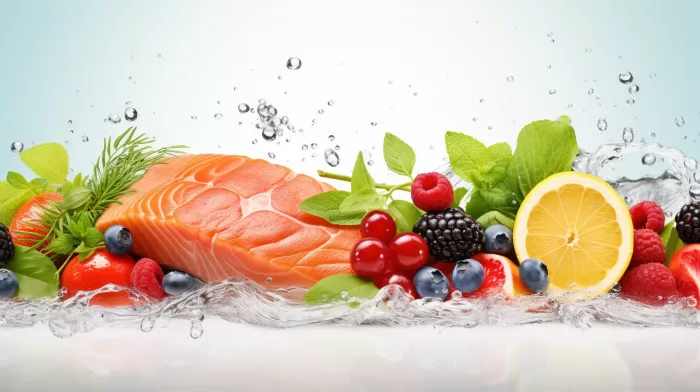The good news is that by making a few simple changes to your diet, you can improve your chances of keeping your brain big and strong. In this article, we’ll dive deep into the specific nutrients your brain needs, and the foods where you can find them.
The Miracle Nutrients Your Brain Needs
First, let’s look at the nutrients that were found to have a significant impact on brain health:
- Omega-3 Fats – These are found in oily fish like sardines and salmon. Omega-3 fats are essential for brain health because they help build and repair brain cells. They also reduce inflammation in the brain, which is believed to contribute to cognitive decline.
-
Vitamin C – Found in fruits and vegetables like oranges, strawberries, bell peppers, and broccoli, vitamin C is an antioxidant that helps protect the brain from damage caused by free radicals. It also supports the production of neurotransmitters, which are essential for proper brain function.
-
Vitamin D – This important vitamin is found in fatty fish, fortified milk, and sunlight. It supports brain health by helping to maintain the structure of brain cells and promoting the growth of new neurons. A deficiency in vitamin D has been linked to cognitive decline and dementia.
-
Vitamin E – Found in nuts, seeds, and vegetable oils, vitamin E is another powerful antioxidant that protects brain cells from oxidative stress. This type of stress can lead to the deterioration or death of brain cells, which can contribute to cognitive decline.
-
B Vitamins – These include vitamins B6, B12, and folic acid, which are found in a variety of foods such as whole grains, beans, eggs, and leafy greens. B vitamins help the brain produce energy, reduce inflammation, and maintain healthy levels of homocysteine, an amino acid that, at high levels, has been linked to an increased risk of cognitive decline and Alzheimer’s disease.
Foods to Avoid for a Healthy Brain
On the other end of the spectrum, there are certain foods that have been found to be detrimental to brain health. Foods high in trans fats, which are found in packaged, fast, fried, and frozen foods, as well as baked goods and margarine spreads, can actually lead to a shrinking brain. This is because trans fats increase inflammation within the brain and are thought to contribute to the development of Alzheimer’s disease.
Now that you know what nutrients your brain needs and what foods to avoid, let’s look at specific examples of meals you can prepare to ensure you’re giving your brain the best possible fighting chance.
Breakfast Ideas for Optimal Brain Health
- Salmon and avocado toast – Top a slice of whole grain toast with avocado mash, smoked salmon, and a sprinkle of chia seeds for a brain-boosting start to your day.
- Greek yogurt with mixed berries and nuts – Combine plain Greek yogurt, fresh mixed berries, and a handful of almonds or walnuts for a power-packed, brain-boosting breakfast.
- Veggie-packed omelette – Whisk together eggs, chopped spinach, onions, and bell peppers for a vitamin-rich omelette. Top with avocado slices and a sprinkle of cheese for extra flavor.
Lunch and Dinner Ideas for Optimal Brain Health
- Grilled salmon with quinoa and roasted vegetables – Marinate and grill a salmon fillet while preparing quinoa and your favorite roasted vegetables, such as broccoli, bell peppers, and zucchini. Finish with a squeeze of lemon juice and a drizzle of olive oil for a healthy and delicious meal.
- Kale and white bean soup – Sauté garlic, onion, and celery in olive oil, then add kale and white beans to make a hearty and nutritious soup. Add cooked quinoa or brown rice for an extra boost of B vitamins and fiber.
- Spinach and goat cheese stuffed chicken breast – Stuff a chicken breast with sautéed spinach and goat cheese before baking it in the oven. Serve alongside a mixed green salad for a delicious and brain-friendly meal.
Snack Ideas for Optimal Brain Health
- Mixed nuts – Grab a handful of mixed nuts, such as almonds, walnuts, and pecans, for an easy and brain-boosting snack.
- Hummus and veggie sticks – Pair carrot sticks, cucumber slices, and bell pepper strips with hummus for a nutrient-dense snack option.
- Fruit salad – Combine fresh fruit like apples, oranges, strawberries, and blueberries for a delicious and brain-healthy snack.
In summary, it’s clear that the right diet can have a significant impact on maintaining brain health as you grow older. By incorporating brain-friendly nutrients and avoiding damaging foods like trans fats, you can give yourself the best possible chances of staying sharp, focused, and cognitively strong throughout your lifetime. So go ahead and make those simple changes to your diet and give your brain the support and fuel it needs to keep you healthy and happy for years to come.



